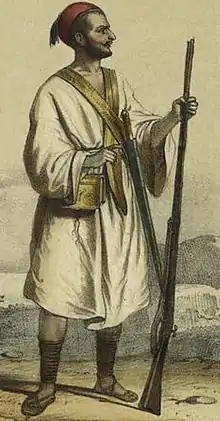Igawawen
The Igawawen or Gawawa (Kabyle: ⵉⴳⴰⵡⴰⵡⵏ Igawawen, IPA: /ɪʝæwæwən/; masc. sg. ⴰⴳⴰⵡⴰⵡ Agawaw /æʝæwæw/, ⴰⴳⴰⵡⴰ Agawa /æʝæwæ/) were a confederation of Kabyle Berber tribes in Algeria. The Arabs called them Zwāwa (Maghrebi Arabic زواوة, also written Zouaoua from French transliteration; the masculine singular is زواوي, i.e. Zwāwi/Zouaoui). The Arabic term Zwāwa had been previously used to refer to Kabyle fighters rather than the Igawawen in particular, and it is unclear if the original meaning of the term was ethnic.
The tribes which made up the confederation inhabit the highland areas of the Kabylie, from Djurdjura to the sea, which is the area of Tizi Ouzou Province and parts of Bouïra Province and Boumerdès Province. In French this area is called Grande Kabylie to distinguish it from the other parts of Kabylie, the Petite Kabylie
Arabic name
The Arabic term Zwāwa appears to be of Berber origin, but its original meaning is unclear. It may or may not be an Arab version of the Berber word Gawawa, an alternative form of Igawawen. Zwāwa is in fact used in an early case as a (singular) name: the historian ibn Khaldun (1332-1406) referred to a Berber chief he calls Zwāwa ibn Na'm al-Halfa leading a Berber contingent in the Muslim conquest of Sicily (827-902). However Ibn Khaldun was born over four centuries after the events he was describing and there may be some confusion.
In early Arabic sources, the term Zwāwa is used to refer to Kabyle fighters rather than the Igawawen in particular. While the meaning always indicates Berbers, it is unclear if the original meaning was one ethnic group in itself, or had some other ethnic-social implication such as "Berber warriors", "Kabyle men", "Kabyle bandits", etc.
Composition
The exact tribal composition of the Igawawen varied over the centuries. There were a much larger number of Igawawen tribes in the fourteenth century than in the nineteenth, suggesting that tribes were merged or subsumed into larger ones over the centuries. In the nineteenth century, the Igawawen were a confederation of eight tribes of Kabyle Berber ethnicity.[1][2]
By time of the French conquest in the nineteenth century, the Igawawen were a confederation of two federations of four tribes each:
- The Ait Betrun federation
- The Ait Yanni tribe
- The Ait Wasif tribe
- The Ait Bu Akkash tribe
- The Ait Budrar tribe
- The Ait Mangellat federation
- The Ait Mengallat tribe
- The Ait 'Ettaf tribe
- The Ait Weqbil (or Akbil) tribe
- The Ait Bu Yussef tribe
In 1868 it was estimated by a French official named Hanoteau that the Ait Betrun federation's settlements had 19,749 inhabitants, and the Ait Mangellat federation's settlements had 14,429 inhabitants, giving the entire territory of the Igawawan a total population of 34,178.
Ibn Khaldun, writing five centuries earlier, refers to twenty-five Zwawa tribes. This includes the Beni Mengellat and Beni Batrun (i.e. Ait Mangellat and Ait Betrun) as well as others of the eight tribes above, but also includes other groups such as the Beni Bu Sha'ib, the Medjesta, the Mesheddala, and a group called the Melikish which he suggests have Sanhaja
Pre-Colonial times

Under the Deylik of Algiers the Igawawen served as warriors under the dey. They usually formed cavalry units, and fought many wars and battles starting from the 16th century. Their role as warriors was augmented when in 1817 Ali Khodja allied with the Zwawa overthrew the hostile Janissary government, and instated the Zwawa as a close ally and partner.[3] Following that, the confederacy became an important part of the country. During the Invasion of Algiers in 1830, the Zwawa fought against the French with other tribes. Out of the 3,000 berber warriors, the majority were Zwawa. After the fall of Algiers, the Zwawa continued resisting. In 1837 the Zwawa allied with Emir Abdelkader. Under the command of Abdelkader's general Ahmed bin Salem, they fought the French in the Kabylia area until 1847, when Ahmed surrendered to France. Some of the tribes under the confederacy only surrendered in 1857 after the defeat of Lalla Fatma N'Soumer.
Zouaves
The Zwawa gave their name to the Zouaves, since it was intended that the first Zouave units would be raised from this group of tribes, although in the end they were raised from a much wider pool of recruits and eventually became specifically European units. The term Zouave already existed in French, and in its oldest known use from the seventeenth century was a reference to Kabyle soldiers in general, referencing the important part of the Zwawa in the army of Algiers.
See also
Notes
- The world in so many words by Allan A. Metcalf p.65
- The eclectic magazine of foreign literature, science, and art Vol.2 p.699
- Boyer, P. (1970). "Des Pachas Triennaux à la révolution d'Ali Khodja Dey (1571-1817)". Revue Historique. 244 (1 (495)): 99–124. ISSN 0035-3264.